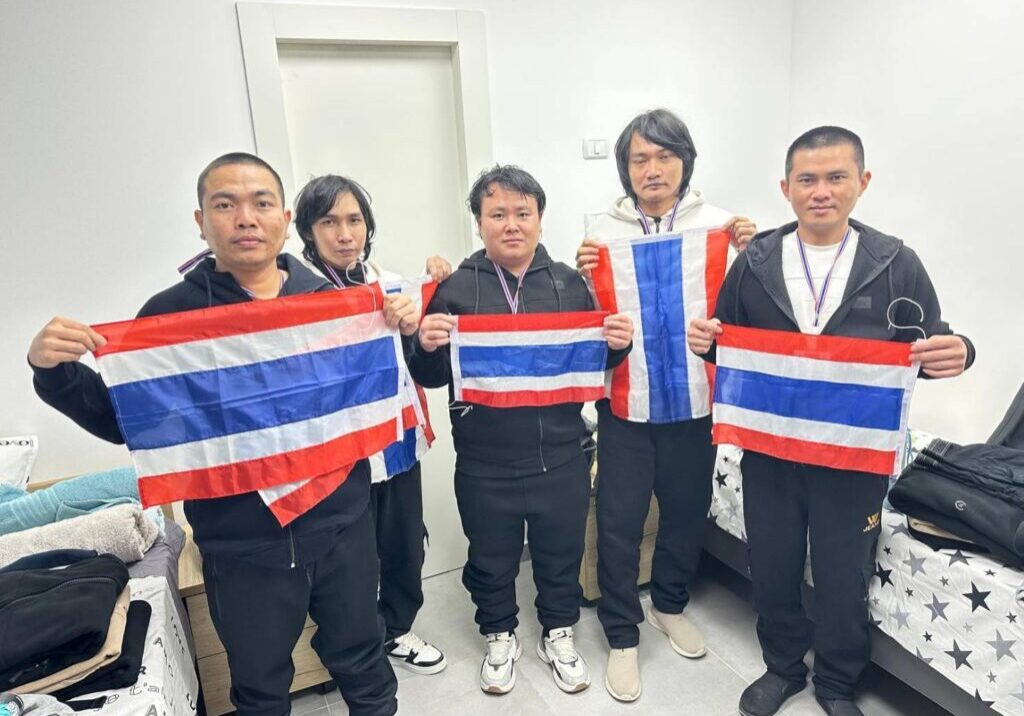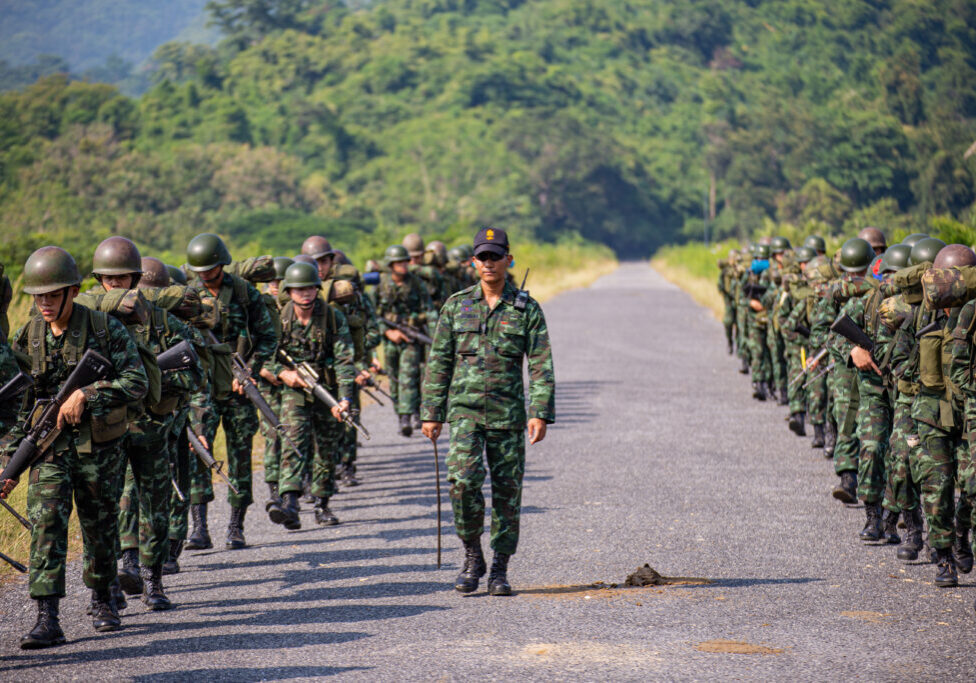Australia/Israel Review
Military Thais
Oct 2, 2006 | Zachary Abuza
On the evening of 19 September, the Thai Army commander, General Sonthi Boonyaratglin, seized power in a bloodless coup from caretaker Prime Minister Thaksin Shinawatra. It was the first coup in Thailand since 1992, when General Suchinda Kaprayoon’s attempt was thwarted by massive street demonstrations by Bangkok’s emerging middle class. Since then, the Thai military had extricated itself from politics and democracy was consolidating. What led to the coup and what will the implications be for Thailand’s growing Islamist insurgency?
Some commentators have focused on the fact that the coup came days after insurgents staged six bombings that killed five people, including two foreigners, in the southern commercial hub of Hat Yai, beyond the three predominantly Muslim provinces that have borne the brunt of the violence. However, the coup is firmly rooted in elite politics.
In February 2005, Prime Minister Thaksin and his Thai Rak Thai (TRT) party won the election by the largest margin ever in Thai history. The TRT’s dominance was so near total that parliament was irrelevant. Thaksin’s position seemed unassailable until the staunch economic nationalist who rose to power in 2000 on a xenophobic populist platform sold his family’s corporation to Temasek, the Singapore Government’s holding company. It was not just the hypocrisy of the sale of a vital national asset, the largest telecommunications company, that galled the middle class but the fact that it was done without any tax paid on the nearly $2 billion in profits. Street protests broke out. Thaksin decided to quash dissent by dissolving parliament and winning a new popular mandate in polls held on 2 April 2006. The opposition, led by the Democrat Party successfully boycotted the polls, following Thaksin’s refusal to implement political reforms. Though Thaksin’s TRT won a plurality of votes, in many districts their candidates did not win more than the 20 percent of votes needed to be elected. A re-election was held, but again the boycott was effective. The Supreme Court in the meantime invalidated the entire election. A new election was scheduled for 15 October, but that too was delayed.
Following the April election, Prime Minister Thaksin announced that he would not have a position in the next government and was taking a “vacation from politics.” He left the caretaker government in the hands of Chidchai Vanasatidya, his most trusted lieutenant, and the architect of policies in the south. Thaksin returned to government with very little public outcry in May 2006 and has headed the caretaker government without parliamentary checks.
The coup leaders were clearly concerned about this ongoing political stalemate and justified their extra-legal action saying that it was for the sake of national unity. But there were many other factors at play. Thaksin and his cronies represent the nouveau riche of Thailand and are despised by the monarchy and the old Sino-Thai taipans. Many in the security establishment also resent Thaksin, a former policeman, for promoting many of his former colleagues and friends, over better qualified and more senior officers. Finally there was disgust amongst the officer corps of both the army and police at political interference in quelling the southern insurgency.
During Thaksin’s tenure, Thailand has faced an Islamist secessionist movement since January 2004 (though really from 2001-02) that has led to the deaths of more than 1,300 people. (Some reports are now placing the number at 1,700). There have been nearly 400 successful bombings and many more attempted bombings and over 400 arson attacks. Militants have assassinated more than 600 people; 24 people have been beheaded. Ten of the 33 districts in the deep south are “plagued by violence” according to the Ministry of the Interior, and the number is increasing. Violence has taken on a distinct sectarian tone and in many parts of the deep south there has already been de facto ethnic cleansing. May 2006 recorded the highest number of assassinations in a month; and though bombings are down from their May-June 2005 high, they have been steadily climbing throughout 2006. In June 2006 there were some 62 bombings over a four-day period; on 1 August, there was another spate of 50 bombings/arson attacks across four provinces, with 20 additional bombs defused. While insurgents have been stepping up their coordinated attacks and the bombs were relatively small, coordinated attacks of this magnitude are unprecedented and belie the technical sophistication and organisational capacity of the militants. In August, 22 commercial banks in Yala were bombed in one morning. Though only one person was killed in the attacks, it hurt the already economically fragile economies of the south. This show of force was a stunning rebuke to the Thai security forces. Although they claim to have arrested 700 militants, they have captured almost no one in leadership positions (the few who have been were arrested by the Malaysians), and still have only the slightest understanding of the insurgents’ structure and capacity.
To date, there has not been a single credible claim of responsibility, nor have the insurgents publicly stated their goals or political platform. There are a number of insurgent groups working together, the Barisan Revolusi Nasional-Koordinasi (BRN-C) and its youth wing Pemuda, Gerakan Mujihidin Islami Pattani (GMIP), and New PULO. And unlike the insurgency in the 1960s to the early-1990s, when groups were sharply divided over their goals and ideology and proved absolutely incapable of working together, today’s organisations share a common Islamist agenda and are demonstrating unprecedented coordination and cooperation. No organisation is trying to discredit another to build up its power base at the expense of another. We are also seeing the Wahhabi practice of takfiri – branding fellow Muslims as non-Muslims. To date more than 60 percent of the insurgents’ victims have been fellow Muslims.
The insurgency was clearly exacerbated by elite politics. First, it was Thaksin’s disbandment of important army-controlled institutions, CPM-43 and the Southern Border Province Administrative Centre (SBPAC), in May 2002, and transfer of authority of the southern provinces to his cronies in the police that led to the crisis. The police were ill-equipped to deal with a renewed insurgency and the army withheld vital human intelligence and other assistance. Thaksin believed that the 4th Army was too close to the opposition Democrat Party that dominates the south. Thaksin then appointed three TRT allies to the governorships of the south. None had experience in the south or understood the complexities of the situation.
The policies of Thaksin and his closest ally, Deputy Prime Minister Chidchai, as well as their constant political interference and personnel changes, exacerbated the situation in the south. In June 2006, Thaksin gave Sonthi full control over the south but in reality southern policy was still being very much controlled by Chidchai. Sonthi seemed to be the scapegoat for the failed policies. On paper, he had full control, but in reality he had very little. He was the fall guy for Thaksin who has taken no responsibility for an insurgency that unfolded during his tenure. By early September, Sonthi and other officers had publicly lashed Thaksin and Chidchai for political meddling, and Thaksin was purportedly trying to oust Sonthi at the time of the coup.
Will the coup lead to improvements in counter-insurgent operations? This remains to be seen. While the coup leaders have announced that they will soon turn over power to a civilian caretaker administration, control over the south will remain firmly in the military’s hands.
There are three reasons to think that the coup will lead to an improvement in countering the insurgency. First, unlike Thaksin who flagrantly ignored the recommendations of the National Reconciliation Council, Sonthi is likely to begin implementing them. Though the NRC’s recommendations alone will not quell the insurgency, they will have an important impact in regaining the trust of the Muslim community. Second, under Sonthi there will be more consistency in personnel and policies. At the very least, there will be less political interference in counter-insurgent operations and fewer personnel reshuffles and policy initiatives from an impatient “CEO prime minister.” Under Thaksin, there have been four 4th Army commanders since 2001. Counterinsurgency takes time. Third, Sonthi has expressed a willingness to talk with insurgents, though to date only PULO has offered to talk and the aged leaders in Europe have no control over the insurgents. In sum, these could improve relations with an increasingly distrustful and angry Muslim community, which believes the government is oppressive, and the security forces act with total impunity and yet do not provide adequate protection from the insurgents. With improved relations with the civilian population should come improvements in human intelligence, which is essential.
Yet, there are many reasons to suggest that there will be little change. First, many in the military establishment, including Sonthi, himself a Muslim, have publicly refused to see the insurgency for what it is – denying it any religious overtones or secessionist goals. Sonthi believes that the insurgency is fundamentally about economic deprivation and social justice, which while not untrue, misses the nature of the Muslim-on-Muslim violence. Second, while there was political interference, we should not forget that the south has been under martial law since January 2004, and the provisions of the 2005 Emergency Decree give the military sweeping powers; all of which have failed to stem the violence. Nor is the political situation likely to alter the campaign of the insurgents. If anything they may step up attacks in an attempt to provoke a heavy-handed government response.
Dr. Zachary Abuza is a leading scholar on terrorism in South East Asia and the author of Militant Islam in Southeast Asia: Crucible of Terror. He is Associate Professor for Political Science and International Relations at Boston’s Simmons College, but has been on study-leave in Thailand in recent months. He will be visiting Australia this month as a guest of AIJAC.






